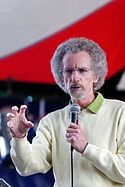Philip Yancey Quote
Playing off a short story by H. G. Wells, Simone Weil drew an analogy to a land of blind people in which scientists could devise a complete system of physics leaving out the concept of light. Weightless, pressureless, undetectable by the senses — why believe in light? To the blind, it need not exist. Occasionally, however, questions might arise among the blind. What makes plants grow upwards, defying the law of gravity? What ripens fruits and seeds? What warms the night into day? Light in a country of the blind, says Weil, parallels the role of God on earth. Some of us sense traces of the supernatural, yet how do we prove it to people who can’t detect it?
Philip Yancey
Playing off a short story by H. G. Wells, Simone Weil drew an analogy to a land of blind people in which scientists could devise a complete system of physics leaving out the concept of light. Weightless, pressureless, undetectable by the senses — why believe in light? To the blind, it need not exist. Occasionally, however, questions might arise among the blind. What makes plants grow upwards, defying the law of gravity? What ripens fruits and seeds? What warms the night into day? Light in a country of the blind, says Weil, parallels the role of God on earth. Some of us sense traces of the supernatural, yet how do we prove it to people who can’t detect it?
Related Quotes
About Philip Yancey
Philip Yancey (born November 4, 1949) is an American author who writes primarily about spiritual issues. His books have sold more than 15 million copies in English and have been translated into 40 languages, making him one of the best-selling contemporary Christian authors. Two of his books have won the ECPA's Christian Book of the Year Award: The Jesus I Never Knew in 1996, and What's So Amazing About Grace? in 1998. He is published by Hachette, HarperCollins Christian Publishing, InterVarsity Press, and Penguin Random House.
